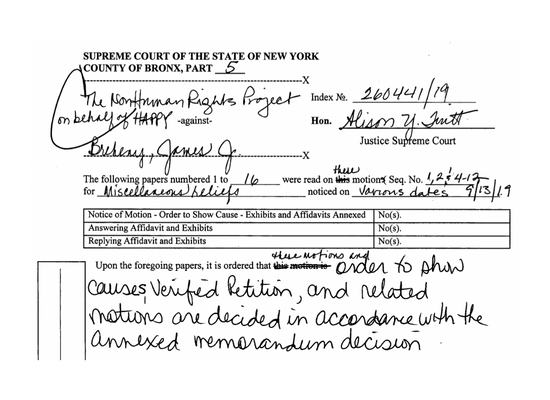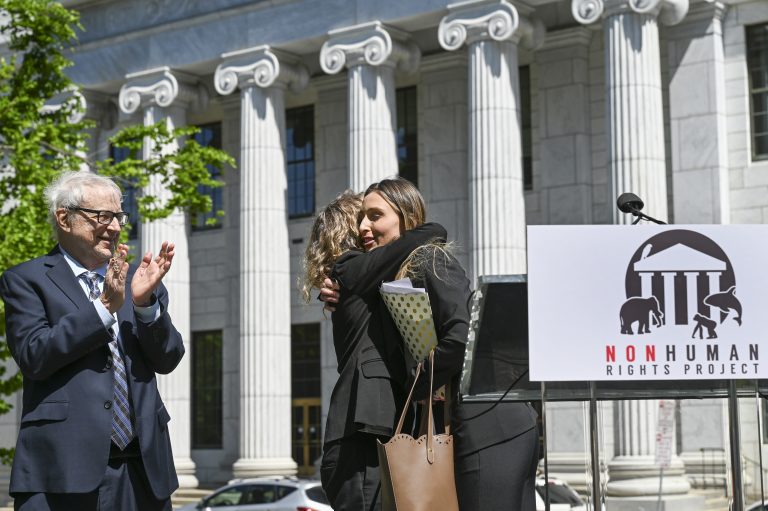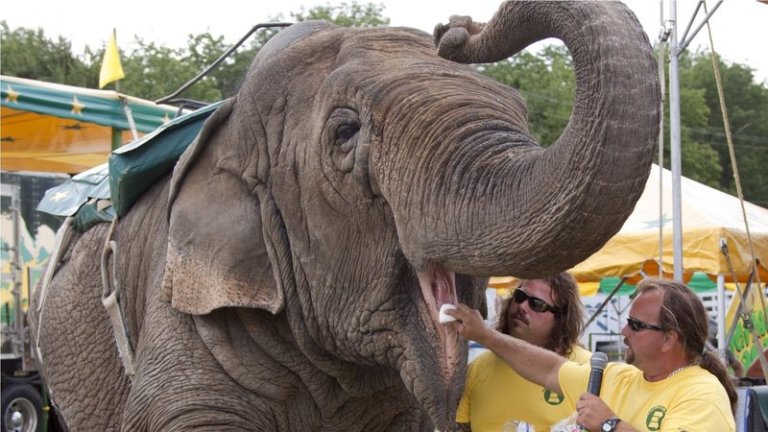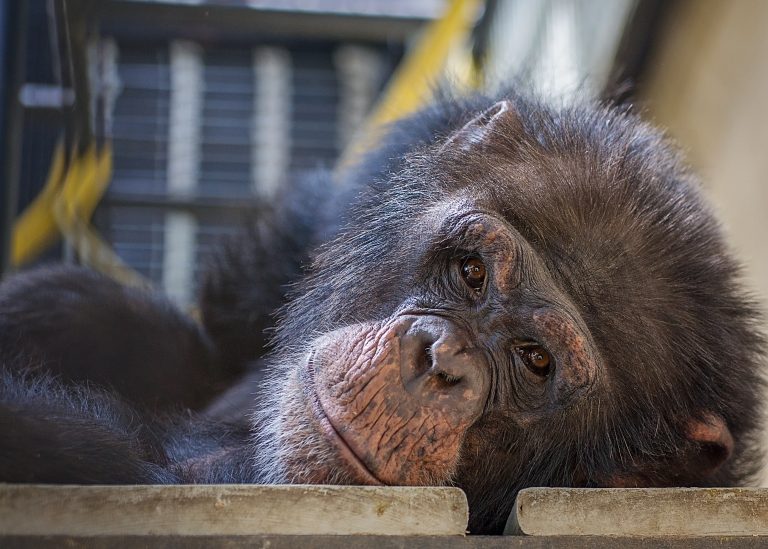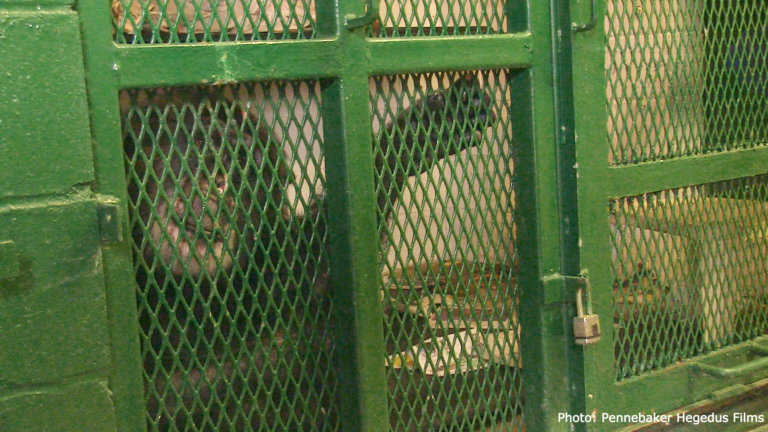The fight to free Happy
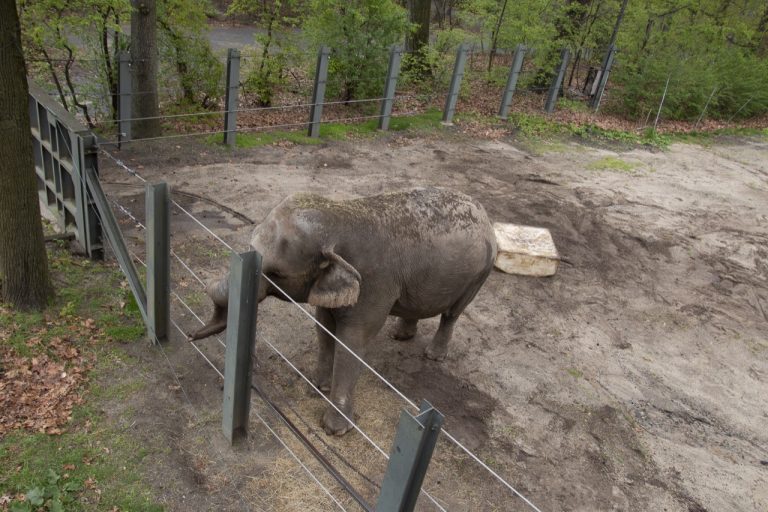
Happy
Happy is a female Asian elephant who was born in the wild in 1971. “Captured as a baby, probably from Thailand, in the early 1970s, along with six other calves, possibly from the same herd,” according to The New York Times, she was imported to the US and sold for $800 to the now defunct Lion Country Safari in California, which named the calves after the dwarves in Snow White and the Seven Dwarves. That same year, Sleepy died, and the corporation relocated Happy, Grumpy, Sneezy, Doc, Dopey, and Bashful to the still-operational Lion Country Safari in Florida.
In 1977, the proprietors relocated all six elephants to circuses and zoos across the US. Happy and Grumpy were sent to the Bronx Zoo (managed by the Wildlife Conservation Society, formerly the New York Zoological Society) to be part of the newly created Wild Asia Monorail exhibit (then called the Bengali Express Monorail). There, in addition to displaying the elephants, the zoo, through the 1980s, compelled them to give rides, participate in tug-of-war contests, and perform tricks, as publicized by The New York Times (“Fordham’s Rams Defeat Zoo’s Elephant in Bronx,” “Two-Day Party in Celebration of Elephants at Bronx Zoo”) and The New Yorker (“Elephant Extravaganza”). Of Happy’s demeanor and role in these purportedly educational shows, the elephants’ “low-key, no nonsense trainer” said: “Happy is a more physical elephant than anything I’ve ever seen … Most people, when they train elephants, cats, horses or whatever, usually turn them loose and just watch them for hours. Then you can figure what trick to put on each elephant. Happy runs more, she moves more, she’s rougher. That’s why I put all the physical tricks on her: the hind-leg stand, the sit-up.”
In 2002, the Bronx Zoo euthanized Grumpy after she was attacked by two other elephants held in captivity there. The zoo separated Happy from Patty and Maxine and introduced a younger female Asian elephant named Sammie to be Happy’s companion.
In 2005, Happy became the first elephant to “pass” the mirror self-recognition test, considered to be an indicator of self-awareness.
That same year, the Bronx Zoo euthanized Sammie after she suffered kidney failure. Shortly after, the zoo announced it would end its captive elephant program once one or more of the elephants had died: “If two die, officials say it would be inhumane to sustain an exhibit with a single elephant.”
From 2006 to the present, to protect Happy from the other elephants and with assurances from zoo director Jim Breheny that Happy is sufficiently happy where she is, “The Bronx Zoo’s Loneliest Elephant” has lived alone, without a true elephant companion, in a rotating portion of the 1.15-acre exhibit. According to The New York Post, “Happy spends most of her time indoors in a large holding facility lined with elephant cages, which are about twice the length of the animals’ bodies. The public never sees this.”
In November of 2018, Maxine died, leaving Patty and Happy each alone in the exhibit.
Happy’s attorney before New York’s highest court
Monica is a highly experienced lawyer who’s been with the NhRP for over a decade. She’s one of the youngest women to argue before the US Supreme Court. She argued for Happy’s right to liberty before the New York Court of Appeals in a hearing covered by media around the world.
Who's joined us in the fight
Amicus support
In addition to the affidavits submitted by elephant cognition and behavior experts at the outset of our litigation, the NhRP’s legal fight for Happy’s freedom has gained the support of experts on habeas corpus, animal law, philosophy, religion, and more.
Donate to support the fight
Donate online
Mail a check
611 Pennsylvania Ave SE #345
Washington, DC 20003
Planned giving
Create a fundraiser
Highlights from the fight
Media coverage
A timeline of Happy’s case
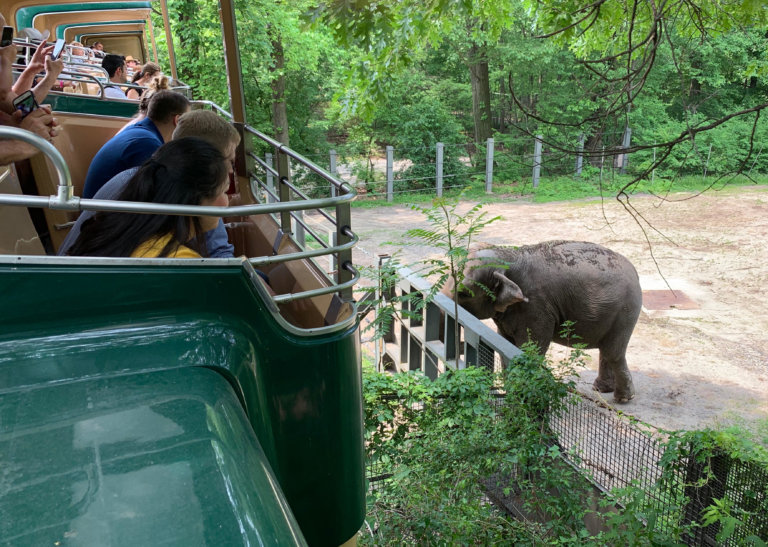
Historic hearing: 5.18.22
Landmark dissents: 6.14.22
The Court of Appeals issues a decision in Happy’s case with two dissents. Our statement:
We applaud the powerful dissents by the Honorable Judges Jenny Rivera and Rowan D. Wilson, which we see as a tremendous victory in a national and global struggle for nonhuman animal rights which we’ve only just begun.
They follow similarly supportive arguments made by the Honorable Judge Eugene M. Fahey in our chimpanzee rights cases before he retired from the Court in January of 2022. Judges Rivera, Wilson, and Fahey join a growing body of judges from around the world who are considering and recognizing nonhuman animals as rights-holders, and we look forward to citing these dissents in our elephant rights case already underway in California and in the new cases we’ll file across the US and in other countries in the coming months. We have persuaded three judges on New York’s highest court since 2018; we know we’ll persuade more.
At the same time, this is not just a loss for Happy, whose freedom was at stake in this case and who remains imprisoned in a Bronx Zoo exhibit. It’s also a loss for everyone who cares about upholding and strengthening our most cherished values and principles of justice–autonomy, liberty, equality, and fairness–and ensuring our legal system is free of arbitrary reasoning and that no one is denied basic rights simply because of who they are.
As Justice Wilson wrote, “When the majority answers, “No, animals cannot have rights,” I worry for that animal, but I worry even more greatly about how that answer denies and denigrates the human capacity for understanding, empathy and compassion.”
With the support of diverse, renowned experts in law, philosophy, religion, elephant cognition, social justice, and more, we sought Happy’s legal personhood and right to liberty under New York common law, which is judge-made law that’s meant to evolve with the times. We lament that the Court chose not to do its clear common law duty in this case by bringing Happy’s legal status into the 21st century. In this respect, the majority of the Court appears to be out of touch with the times and has demonstrated a deep misunderstanding of what Happy’s case is about.
The fact remains that Happy deserves to live freely and with peace and dignity in the vastly larger, more natural environment of a sanctuary designed to respect elephant autonomy. Judge Rivera is right when she wrote in her dissent that “a gilded cage is still a cage. Happy may be a dignified creature, but there is nothing dignified about her captivity.” That’s why we’ll continue our grassroots campaign for her release at the same time as we consider our legal options and next steps in New York. We’ll provide further analysis of the decision and dissents in the coming days.
What’s clear right now is that these dissents, as well as the fact that Happy had a hearing in the highest court of the state in which she’s been imprisoned for half a century, offer tremendous hope for a future where elephants no longer suffer as Happy has and where nonhuman rights are protected alongside human rights. This is the first time the highest court of an English-speaking jurisdiction has heard a case demanding a legal right for a nonhuman animal. It will be far from the last. To everyone in New York and around the world who’ve joined us in calling for Happy’s right to liberty, thank you for helping us build this future, step by step, case by case, for as long as it takes–for Happy and for all autonomous beings who are deprived of their freedom.zz
10.2.18
The NhRP files a petition for a common law writ of habeas corpus in the New York Supreme Court, Orleans County. Read our Memorandum of Law and affidavits submitted in support by elephant cognition and behavior experts Lucy Bates and Richard W. Byrne (#1 and #2), Karen McComb, Cynthia Moss, Joyce Poole (#1 and #2), and Ed Stewart.
10.9.18
The Wildlife Conservation Society, which manages the Bronx Zoo, files a Memorandum of Law in opposition. Bronx Zoo Director Jim Breheny files an accompanying affidavit.
10.11.18
The NhRP files a Motion to Strike in response to the Wildlife Conservation Society’s improper filing of its Memorandum, which seeks to prematurely litigate some of the issues the NhRP raises in our petition and Memorandum.
10.25.18
The NhRP files a motion asking the Court to rule by Nov. 30th or immediately thereafter. As detailed in the Memorandum of Law that accompanies our Motion to Rule, “the NhRP respectfully submits that it is entitled [under New York law] to a prompt ruling by this Court on whether it will issue the Order to Show Cause so that Happy’s ongoing unlawful imprisonment may be addressed without delay.”
11.16.18
Orleans County Supreme Court Justice Tracey A. Bannister issues the Order to Show Cause requested by the NhRP. This requires lawyers for the Bronx Zoo and the Wildlife Conservation Society to come to court to attempt to justify Happy’s imprisonment, marking the first time a habeas corpus order has been issued on behalf of an elephant.
12.3.18
The Wildlife Conservation Society files a Notice of Motion, Memorandum of Law, and attorney affidavit. Patrick Thomas, Vice President and General Curator of WCS and Associate Director of the Bronx Zoo, files an affidavit in opposition to the NhRP’s habeas corpus petition, as does the chief veterinarian of the Bronx Zoo, Paul Calle. Bronx Zoo Director Jim Breheny files a supplemental affidavit.
12.10.18
The NhRP files a Reply Memorandum of Law and a brief opposing a Motion by the Alliance of Marine Parks & Aquariums, Protect the Harvest, and the Zoological Association of America to file an amicus brief. Joyce Poole files a second supplemental affidavit in support of the NhRP.
12.12.18
The NhRP files a motion for preliminary injunction to prevent the Wildlife Conservation Society from moving Happy out of state until the case is resolved.
12.13.18
The Wildlife Conservation Society files a Reply Memorandum of Law in further support of its motion to dismiss or transfer venue and in opposition to our motion for a preliminary injunction.
12.14.18
The NhRP argues for Happy’s legal personhood and fundamental right to bodily liberty in the New York Supreme Court, Orleans County. At the end of the hearing, the judge suggests from the bench that she will likely transfer the case to Bronx County. Read our press release here and the transcript here.
1.8.19
Under New York law, the Wildlife Conservation Society drafts the Transfer Order and sends it to the NhRP for review before submitting it to the Court, which formally enters it. While we wait for WCS’s draft, we file a motion, attached to a proposed Order to Show Cause, asking Justice Bannister to stay (i.e. temporarily suspend) the Transfer Order after she enters it so we’ll have the opportunity to request permission to reargue on the grounds that the Court misapprehended the law and the facts governing venue (i.e. where Happy’s case will proceed).
1.14.19
Justice Bannister grants the NhRP’s Stay Motion on the still forthcoming Transfer Order, and the clerk tells us Justice Bannister will hear oral arguments on our Motion for Leave to Reargue on Feb. 1st at the New York Supreme Court, Orleans County.
1.18.19
Justice Bannister formally signs and enters the order to transfer the case to Bronx County.
1.23.19
The NhRP files our Motion for Leave to Reargue and a Memorandum of Law in support of our Motion.
1.24.19
The NhRP files a second motion to stay the Transfer Order in the event that Justice Bannister denies our Motion for Leave to Reargue after oral arguments. Read the accompanying Memorandum of Law here. In the event that Justice Bannister adheres to her prior decision to transfer the case, we also file a Motion for Permission to Appeal (see Memorandum of Law in support) as a way of preparing for any eventualities we’re in a position to anticipate.
1.25.19
The Wildlife Conservation Society files a Memorandum of Law in opposition to our Motions for Stay and Reargument along with an affidavit by Joanna Chen, an attorney with the firm representing WCS (see Exhibits to Affidavit).
1.30.19
The Wildlife Conservation Society files a Memorandum of Law in opposition to our Motions for Stay and Permission to Appeal. The NhRP files a Reply Memorandum of Law in support of our Motion for Leave to Reargue (i.e. a reply to WCS’ arguments as to why we shouldn’t be able to ask Justice Bannister to reverse her Transfer Order and allow the case to proceed in Orleans County).
2.5.19
In a telephone hearing ordered by Justice Bannister, the NhRP argues that her Transfer Order is based on a misapprehension of the law and facts governing venue in habeas corpus cases. As detailed in our Memorandum of Law and explained by NhRP President Steven M. Wise on the call, we have the right to file suit in any county under New York habeas corpus procedure and none of the relevant provisions permit Justice Bannister to change the venue after she made the habeas corpus order she issued in November returnable in Orleans County. Moreover, habeas corpus cases not involving state institutions don’t require a “nexus” between the litigation and the venue, as the Wildlife Conservation Society wrongly maintains. At the end of the call, Justice Bannister maintains her decision to change the venue to Bronx County and denies our Motion for Permission to Appeal. However, she grants us our requested 30-day stay (i.e. a temporary suspension of the Transfer Order) so we can ask the Fourth Judicial Department for permission to appeal on the venue issue. Read the hearing transcript here.
3.25.19
The NhRP files a motion with the Fourth Judicial Department seeking discretionary appellate review on the issue of venue. As we detail in our Memorandum of Law, transferring Happy’s case to Bronx County is not only a serious legal error, but will also cause intolerable delay and prolong the injustice currently being visited on Happy as an imprisoned autonomous being.
4.8.19
The Fourth Judicial Department denies appellate review on the issue of venue and enters the Transfer Order, sending Happy’s case to Bronx County.
7.10.19
The Bronx County Supreme Court schedules a preliminary conference for 8.15.19. Habeas cases are civil actions that typically don’t require such conferences. Regardless, the NhRP is pleased Happy’s case is moving forward in the Bronx.
8.2.19
The NhRP files a Notice of Motion to Strike in response to an improper filing on the part of the Wildlife Conservation Society. As detailed in our accompanying Memorandum of Law, WCS filed its Answer to our habeas corpus petition on behalf of Happy over seven months after the required deadline and without required court permission. Read the Notice of Motion and supporting papers here.
8.7.19
The Wildlife Conservation Society files a Memorandum of Law in opposition to our Motion to Strike.
8.15.19
The NhRP and the Wildlife Conservation Society participate in a preliminary conference in the Bronx County Supreme Court at which it is determined that all pending motions will be argued directly before Justice Alison Y. Tuitt on 9.23.19. The NhRP serves WCS with a Supplemental Memorandum of Law Upon Transfer.
9.23.19
Justice Tuitt hears arguments for nearly five hours, which is unique for arguments on preliminary motions. Justice Tuitt provides the NhRP with ample time to delve into the most pressing issues in Happy’s case, such as who counts as a legal person with rights and why Happy—as a autonomous being—is entitled to the fundamental right to liberty and must be released to a sanctuary. Just before the Bronx County Supreme Court is set to close for the day, Justice Tuitt schedules a second hearing for 10.21.19 to allow for argument on the remaining motions as well as the core merits of Happy’s habeas corpus petition. Read our press release here and read a transcript of the arguments here.
9.29.19
The NhRP requests a temporary restraining order that prevents the Bronx Zoo from moving Happy out of New York State before the 10.21.19 oral arguments.
9.30.19
10.21.19
Justice Tuitt hears arguments for nearly four hours in Happy’s case. The proceedings focus primarily on the merits of Happy’s elephant rights case—Happy’s legal personhood and right to liberty, why the capacity for rights isn’t and never has been limited to human beings, and why Happy, as an autonomous being, should be released to a sanctuary where her right to liberty will be respected. Justice Tuitt ends by scheduling a third day of oral arguments for 1.6.20 and ordering the Bronx Zoo to maintain the status quo of Happy’s situation until she rules on the NhRP’s motion for preliminary injunction, which would prevent the Bronx Zoo from moving her out of state until the case is resolved. Read our press release here. Read a transcript of the arguments here.
1.6.20
The NhRP argues for over three hours before Justice Tuitt in a third and final session of arguments. As the NhRP tells the Court, Happy’s case “is not just about the cause of one poor elephant. It is about the cause of liberty.” Read our press release here and read a the transcript of the arguments here.
2.19.20
Justice Tuitt issues a decision that is powerfully supportive of the NhRP’s legal arguments to free Happy. In it, she “regretfully” denies the habeas corpus relief the NhRP demanded because she felt bound by prior appellate court decisions in the NhRP’s chimpanzee rights cases. However, she agrees with the NhRP and with New York Court of Appeals Justice Eugene M. Fahey that an autonomous nonhuman animal like an elephant or chimpanzee is not merely a legal “thing.” Instead, she writes, Happy “is an intelligent, autonomous being who should be treated with respect and dignity, and who may be entitled to liberty.” Further, Justice Tuitt rejects the Bronx Zoo’s claim that its continued imprisonment of Happy is good for her, stating that “the arguments advanced by the NhRP are extremely persuasive for transferring Happy from her solitary, lonely one-acre exhibit at the Bronx Zoo” to The Elephant Sanctuary in Tennessee. We maintain Justice Tuitt is not bound by these prior decisions and begin working on our appeal. Read our press release here.
7.10.20
The NhRP files our appeal asking the New York Supreme Court, Appellate Division, First Department to recognize Happy’s common law right to bodily liberty, reverse the Bronx Supreme Court’s dismissal of Happy’s habeas petition, and remand the case with instructions to order Happy’s release to a sanctuary: “This Court has the duty to safeguard and uphold the fundamental common law liberty interest of autonomous beings,” writes the NhRP in its appellate brief. “As Happy is an autonomous being, this Court must recognize her right to bodily liberty protected by habeas corpus and order her freed.”
7.14.20
World-renowned legal scholar and Harvard Law School Professor Laurence H. Tribe submits an amicus curiae brief in support of the NhRP, arguing that Happy’s legal personhood and right to liberty should be part of New York’s “noble tradition of expanding the ranks of rights holders.” Read our press release here.
7.22.20
The NhRP shares the news that two habeas corpus scholars and twelve North American philosophers with expertise in animal ethics, animal political theory, the philosophy of animal cognition and behavior, and the philosophy of biology have submitted amici curiae briefs in support of Happy’s legal personhood and right to liberty. The authors of the briefs are:
Justin Marceau (Brooks Institute Research Scholar at the University of Denver, Sturm College of Law) and Samuel Wiseman (Professor of Law at Penn State Law in University Park):
“One of the greatest blemishes on our justice system is the wrongful detention of persons. The Writ of Habeas Corpus is one of the tools available to correct injustices by requiring a person’s captors to justify the person’s imprisonment to the courts. While the Writ has provided a procedural vehicle for vindicating the right of thousands of humans to not be unlawfully detained, this brief argues that the time has come to consider the Writ’s application to other cognitively complex beings who are unjustly detained. The non-humans at issue are unquestionably innocent. Their confinement, at least in some cases, is uniquely depraved—and their sentience and cognitive functioning, and the cognitive harm resulting from this imprisonment, is similar to that of human beings.”
Read Marceau and Wiseman’s brief here.
Andrew Fenton (Dalhousie University), Bernard Rollin (Colorado State University), David Peña-Guzmán (San Francisco State University), G.K.D. Crozier (Laurentian University), Gary Comstock (North Carolina State University), James Rocha (California State University, Fresno), Jeff Sebo (New York University), L. Syd M Johnson (SUNY Upstate Medical University), Letitia Meynell (Dalhousie University), Nathan Nobis (Morehouse College), Robert C. Jones (California State University, Dominguez Hills), Tyler John (Rutgers University-New Brunswick):
“We reject arbitrary distinctions that deny adequate protections to other animals who share with protected humans relevantly similar vulnerabilities to harms and relevantly similar interests in avoiding such harms. We submit this brief to affirm our shared interest in ensuring a more just coexistence with other animals who live in our communities. We strongly urge this Court, in keeping with the best philosophical standards of rational judgment and ethical standards of justice, to recognize that, as a nonhuman person, Happy should be released from her current confinement and transferred to an appropriate elephant sanctuary, pursuant to habeas corpus.”
Read the philosophers’ brief here.
9.11.20
The Wildlife Conservation Society files its brief with the First Department.
9.14.20
Protect the Harvest and the Alliance of Marine Mammal Parks & Aquariums submit an amicus curiae brief in support of the Wildlife Conservation Society and the Bronx Zoo.
9.18.20
Richard Cupp submits an amicus curiae brief in support of the Wildlife Conservation Society and the Bronx Zoo.
9.25.20
The NhRP files its Reply Brief.
11.19.20
The NhRP argues for Happy’s right to liberty before a five-judge panel of the First Judicial Department. Click here to watch the arguments on the Court’s YouTube channel.
12.17.20
The First Department issues its decision, denying habeas corpus relief to Happy and choosing not to correct the serious errors of law the Court made in its 2017 decision denying habeas corpus relief to chimpanzees simply because they aren’t human. In doing so, the NhRP writes in its statement, the Court ignored New York Courts of Appeals Justice Eugene M. Fahey’s 2018 criticism of this decision in which he also wrote that the question of nonhuman animals’ rightlessness is “a deep dilemma of ethics and policy that demands our attention … The issue whether a nonhuman animal has a fundamental right to liberty protected by the writ of habeas corpus is profound and far-reaching. It speaks to our relationship with all the life around us. Ultimately, we will not be able to ignore it.” The NhRP announces we’ll now ask New York’s highest court, the Court of Appeals, to hear our arguments.
1.27.21
The NhRP files a motion urging the Court of Appeals—New York’s highest court—to hear arguments in support of Happy’s right to liberty. Approval from at least two of the seven New York Court of Appeals judges (one of whom is Judge Eugene M. Fahey) is needed for the motion to be granted. This is the fourth time the NhRP has asked the Court of Appeals, which only hears about 5 percent of the cases that request to be heard, to decide whether our autonomous nonhuman animal client should be released pursuant to habeas corpus. As we demonstrate in our motion, her case is a matter of local, state, national, and international importance, and “The Nonhuman Rights Project respectfully submits that the time to address this question [in the New York Court of Appeals] has arrived.”
The motion also details how courts outside New York and around the world have begun to grapple with the broader issue of nonhuman animal rights, most famously in the cases of Kaavan the elephant and Sandra the orangutan, both of whom were imprisoned alone in zoos and released to sanctuaries. The NhRP expects the Court of Appeals to rule on the motion within 6 to 8 weeks of the date we filed it.
2.1.21
The Wildlife Conservation Society files a brief in opposition to the NhRP’s motion for permission to appeal.
2.4.21
The NhRP announces that five Catholic theologians have submitted an amici curiae curiae brief to the New York Court of Appeals in support of Happy’s case. Drawing on their expertise in Catholic moral theology, ethics, animal ethics, ecological theology, theology and science, and bioethics, their brief urges New York’s highest court to accept the NhRP’s appeal and argues that:
“Happy is not a thing for us to confine, use, and put on display in a zoo (even in an attempt to produce a good outcome), but rather a particular kind of creature who God made to flourish in a particular way—a way some academics refer to as a telos. As we explain [in this brief], we believe Happy cannot flourish as this kind of creature while captive in the Bronx Zoo and that she would be significantly better able [to] become the kind of creature God made her to be in a sanctuary … Non-human animals belong to God, not to us. They are God’s creatures, not ours.”
2.12.21
The NhRP files a motion to strike the materially false statements in the Wildlife Conservation Society’s brief in opposition to the NhRP’s motion for permission to appeal.
2.23.21
The NhRP receives the Wildlife Conservation Society’s response to our motion to strike.
3.12.21
“Based on their interest in ensuring the field of animal law develops according to rational principles of justice that are consistent with our legal system’s commitment to equality and liberty,”a group of 50 animal law professors submits an amici curiae brief to the New York Court of Appeals, arguing that the Court should accept the NhRP’s recently filed appeal on behalf of Happy.
Her case, they write, raises novel legal issues of public importance—specifically, “whether our legal system should regard nonhuman animals as legal persons with legitimate claims to justice or, instead, as property that lacks enforceable legal rights.” These issues are “at the philosophical center of the growing field of animal law,” while “popular interest in animal law cases reveals a strong public engagement with the jurisprudential and philosophical questions raised by our legal relationships with animals.” The brief also criticizes the serious inconsistencies in the appellate decisions issued in the NhRP’s chimpanzee rights cases, which erroneously denied the legal right to liberty to the NhRP’s clients on the grounds that they can’t bear duties and responsibilities. Read our press release about the brief here.
3.15.21
The NhRP sends a letter to the New York Court of Appeals to bring to its attention a decision published by the Constitutional Court of Colombia in Chucho the spectacled bear’s nonhuman rights case, which the NhRP discusses in our appeal. It includes a lengthy and powerful dissenting opinion, authored by Judge Diana Fajardo Rivera, that repeatedly and favorably cites to the NhRP’s US litigation, including Happy’s case and Judge Fahey’s opinion. Read our press release about the decision here.
3.22.21
The Wildlife Conservation Society files a motion in opposition to the animal law professors’ amici curiae brief.
4.13.21
The NhRP files a letter with the Court of Appeals that includes an English translation of the Chucho decision.
5.4.21
7.16.21
The NhRP files a 14,000-word brief with the Court of Appeals that brings together centuries of case law including landmark common law and civil rights cases, the science of elephant cognition and behavior, the origin of legal rights, judicial rulings from outside the US that have granted rights to nonhuman animals, and ethical arguments against elephant captivity. Read the brief here, and read our press release here.
7.20.21
The NhRP sends a letter to the Court of Appeals to seek a calendar preference and request that oral argument be scheduled for the November 2021 session.
7.22.21
The Wildlife Conservation Society and the Bronx Zoo send a letter to the Court of Appeals, declining to agree to seek a calendar preference.
7.26.21
The NhRP sends a letter to the Court of Appeals to respond to four points raised in the Wildlife Conservation Society and the Bronx Zoo’s letter and respectfully reiterate our request for oral argument to be scheduled for the November 2021 session. Also on this date, Protect the Harvest, the Alliance of Marine Mammal Parks and Aquariums, the Animal Agriculture Alliance, and the Feline Conservation Foundation request leave to file an amici brief in support of the Wildlife Conservation Society and the Bronx Zoo.
8.4.21
The NhRP files a motion in opposition to the filing of an amici curiae brief by Protect the Harvest, the Alliance of Marine Mammal Parks and Aquariums, the Animal Agriculture Alliance, and the Feline Conservation Foundation.
8.23.21
The Wildlife Conservation Society and the Bronx Zoo file their brief with the Court of Appeals.
8.24.21
Philosopher and University of Chicago Law School Professor Martha C. Nussbaum submits an amicus curiae brief to the Court of Appeals in support of the NhRP’s habeas petition. Drawing on Professor Nussbaum’s widely acclaimed work on justice and animal rights, the brief “argues that the law requires reformation to protect our modern scientific and philosophical understanding that many animals can live their own meaningful lives and that the Court should reform the law in this case.” Read our press release here.
8.25.21
Philosopher and Harvard Professor Christine M. Korsgaard submits an amicus curiae brief to the Court of Appeals in support of the NhRP’s habeas petition.
9.2.21
The Court grants leave to Protect the Harvest, the Alliance of Marine Mammal Parks and Aquariums, the Animal Agriculture Alliance, and the Feline Conservation Foundation to file an amici curiae brief in support of the Wildlife Conservation Society and the Bronx Zoo.
9.7.21
The NhRP files our Reply Brief addressing the Bronx Zoo’s failures to rebut the NhRP’s arguments, its misrepresentations of the NhRP’s arguments, and its omissions of key aspects of the Bronx Supreme Court’s factual determinations regarding Happy’s autonomy and extraordinary cognitive complexity.
9.17.21
The NhRP files a response to the amici curiae brief filed by Protect the Harvest, the Alliance of Marine Mammal Parks and Aquariums, the Animal Agriculture Alliance, and the Feline Conservation Foundation.
9.24.21
Three new amici curiae briefs are submitted in support of Happy’s right to liberty and release to a sanctuary. The first brief is by a group of six expert habeas corpus practitioners and scholars, including four lawyers who worked on the Central Park Jogger case. The second is by 14 philosophers with expertise in animal ethics, animal political theory, the philosophy of animal cognition and behavior, and the philosophy of biology. The third is by five Catholic theologians with expertise in Catholic moral theology, ethics, animal ethics, ecological theology, theology and science, and bioethics.
Also on this date, the National Association for Biomedical Research, the American Veterinary Medical Association (New York), the State Veterinary Medical Society, and the American Association of Veterinary Medical Colleges file amici curiae briefs in support of the Wildlife Conservation Society and the Bronx Zoo.
10.7.21
Three Buddhist scholars with expertise in ethics, Buddhist ethics, bioethics, theology, and comparative religions submit an amici curiae brief in support of the NhRP’s habeas petition. They write: “This legal moment for Happy represents a great opportunity to consider the treatment of sentient beings from a cross-cultural and more moral perspective than we have done before, so as to avoid perpetuating a great moral wrong merely because it has been a habit of the law.”
10.8.21
Edwin Cameron, a retired South African judge acclaimed for his human rights work and hailed by Nelson Mandela as “one of South Africa’s new heroes,” submits an amicus curiae brief in support of the NhRP’s habeas petition. In his brief, Justice Cameron explains that South African law comes from English common law and Roman-Dutch and indigenous law. South African scholars note that the law may “confer legal personality upon any entity that it sees fit…” and “person” refers to an entity capable of legal rights or duties. The idea that protection of nonhuman animals merely involves “indirect views to humanity” is “unpersuasive” for it “skims over issues” and we have “direct moral duties to animals.” It is “the more powerfully forward-looking perspective … becoming part of South African law.”
Also on this date, Dr. Joe Wills (Lecturer in Law, University of Leicester) and 35 other UK-based legal academics, barristers, and solicitors with expertise in animal law submit an amici curiae brief in support of the NhRP’s habeas petition. They write:
“As specialists in animal law in a sister common law country, Amici submit that the Court of Appeals has a historic opportunity to address what Justice Fahey described in his concurring judgment in Nonhuman Rights Project, Inc. ex rel. Tommy v. Lavery as the “profound and far-reaching” issue of “whether a nonhuman animal has a fundamental right to liberty protected by the writ of habeas corpus…” Amici agree with Justice Tuitt in Nonhuman Rights Project, Inc. ex rel. Happy v. Breheny that Happy is “an intelligent, autonomous being who should be treated with respect and dignity” and that the arguments advanced by the Nonhuman Rights Project (“NhRP”) for transferring her “from her solitary, lonely one-acre exhibit at the Bronx Zoo, to an elephant sanctuary” are “extremely persuasive.” Justice Tuitt “regrettably” declined to grant Happy habeas corpus relief, believing her hands were tied by State precedent. This is not a predicament faced by the Court of Appeals. Amici believe that if this Court decides to rule in favor of the petitioners, it will be acting in the finest traditions of the common law writ of habeas corpus which has been utilized in a succession of celebrated rulings by courts in both the UK and US to correct manifest abuses of power where the legislature has failed to act.”
10.21.21
The Bronx Zoo and the Wildlife Conservation Society file a response to philosopher Christine Korsgaard’s amicus curiae brief, retired South African Justice Edwin Cameron’s amicus curiae brief, the philosophers’ amici curiae brief, the habeas corpus experts’ amici curiae brief, the Catholic theologians’ amici curiae brief, and the UK-based legal academics, barristers, and solicitors’ amici curiae brief.
10.22.21
Legal scholars Laurence H. Tribe (Harvard Law School), Sherry F. Colb (Cornell Law School), and Michael C. Dorf (Cornell Law School) submit an amici curiae brief in support of the NhRP’s habeas petition. They write:
“The trial court recognized that Happy is an undeniably and exquisitely cognitively complex being. Respondents contend that she is nonetheless presumptively entitled to none of the benefits sometimes associated with legal personhood unless and until courts are ready to extend all arguably similar beings every benefit of that legal status. That approach would chain the common law writ of habeas corpus to the prejudices and presumptions of the past. It would undercut the great writ’s historic and rightly celebrated capacity to nudge societies toward more embracing visions of justice.”
Also on this date, the NhRP files a response to the veterinary groups’ amici curiae brief.
11.3.21
The New York Farm Bureau, The New York Dairy Producers Association, and The Northeast Agribusiness and Feed Alliance submit an amici curiae brief in support of the Wildlife Conservation Society and the Bronx Zoo.
12.2.21
The Wildlife Conservation Society and the Bronx Zoo file a response to Laurence H. Tribe, Sherry F. Colb, and Michael C. Dorf’s amici curiae brief and the Buddhist scholars’ amici curiae brief.
12.3.21
12.23.21
The Association of Zoos and Aquariums (AZA), the Aquarium of Niagara, the Buffalo Zoo, the Rosamond Gifford Zoo, the Seneca Park Zoo, the Staten Island Zoo, and the Utica Zoo submit an amici curiae brief in support of the Wildlife Conservation Society and the Bronx Zoo.
2.25.22
The NhRP files a response to the amici curiae brief submitted by the Association of Zoos and Aquariums, the Aquarium of Niagara, the Buffalo Zoo, the Rosamond Gifford Zoo, the Seneca Park Zoo, the Staten Island Zoo, and the Utica Zoo.
Also on this date, the NhRP sends a letter to the New York Court of Appeals to inform them of a groundbreaking decision by the Constitutional Court of Ecuador that recognized nonhuman animals as rightsholders.
3.18.22
A group of 27 law professors from across the United States and Canada submit an amici curiae brief in support of the NhRP’s habeas petition. The brief draws in part on the law professors’ special expertise in animal law to argue that “developments in law, ethics, and science warrant the inclusion of at least some nonhuman animals, including Happy, in the community of legal rights-holders who are entitled to justice.”
The law professors join the NhRP in asserting that nonhuman animals like Happy have their own fundamental interests–for example, in their individual liberty–that should be protected by legal rights under the values of New York common law (judge-made law that is meant to evolve with social norms). They also maintain that nonhuman animals are already rights-holders under anti-cruelty statutes and other laws. The professors critique appellate court decisions in the NhRP’s New York chimpanzee rights cases that cited social contract theory–and the erroneous idea that one has to be able to bear legal duties in order to have legal rights–to deny rights to nonhuman animals.
”Legal belonging extends not only to the archetypal humans of social contract theory,” they conclude, “but also to those entities–human and nonhuman–who have secured the protection of their liberties through the enactment of legal protections or who are entitled to such protections by virtue of who they are.”
3.31.22
The NhRP announces the New York Court of Appeals has scheduled arguments for 5.18.22.
4.7.22
Richard Cupp submits an amicus curiae brief in support of the Wildlife Conservation Society and the Bronx Zoo.
4.21.22
The Court grants all pending motions for amicus curiae briefs submitted in support of the NhRP. These include briefs filed by:
Philosophers Peter Singer , Gary Comstock, and Adam Lerner: “In denying that nonhuman persons must be property, both Justice Tuitt and Judge Fahey leave open the possibility that nonhuman animals can be persons. Taking it one step further, the Fourth Department affirmed that it is “common knowledge that personhood can and sometimes does attach to nonhuman entities like . . . animals.” We are pleased to see these favorable judicial assessments concluding that elephants and chimpanzees are not property and may be persons. These legal opinions represent the leading edge of the expanding circle. We write to defend the implicit claim that these animals are persons and have, as a consequence of their personhood, a suitably qualified right to liberty. Philosophical reflection leads inevitably to these conclusions.”
Evan Wolfson (attorney, gay rights advocate, and founder of the Freedom to Marry movement) and Shannon Minter (Legal Director of the National Center for Lesbian Rights): “Just as a human can seek habeas relief from solitary confinement, there are compelling arguments that Happy should be permitted to do so as well. But rather than grapple with those arguments in this and other similar cases, the lower courts have been forced to frame the urgent claims presented in a manner that improperly short circuits them and predetermines a negative result. This is not right. This Court must not turn away from Happy’s plight, or from this being’s plea for justice, for relief.”
Animal Legal Defense Fund: “NhRP iterates that this is a case about Happy’s common law right to bodily liberty and is not a “welfare” case. NhRP’s argument that this Court should recognize Happy’s common law right to bodily liberty for purposes of habeas corpus is persuasive independent of any interplay between habeas corpus jurisprudence and the animal cruelty statute. Nonetheless, the fact that Happy’s solitary confinement appears to violate her rights under the cruelty statute supports her need for a writ of habeas corpus and provides a narrow additional ground to rule in her favor. This fact also dismantles one of the Zoo’s key arguments that its treatment of Happy is lawful.”
K.S. Panicker Radhakrishnan, a former judge of the Supreme Court of India, who decided the landmark animal rights case Animal Welfare Board of India v. A. Nagaraja in 2014: “Indian common law has developed to recognize the basic rights of non-human animals, notwithstanding the absence of these rights in India’s Constitutional and statutory texts. These rights have been located in natural law, environmental principles, and customs and usages. The most fundamental of these rights are the rights to life and liberty. Happy’s solitary and unnatural confinement in a small, concrete space deprives her of these fundamental rights. The common law is sufficiently flexible and progressive to remedy this deprivation.”
Dr. Maneesha Deckha (Professor and Lansdowne Chair in Law at the University of Victoria): “This brief argues that this case presents an opportunity for the common law to depart from an instrumentalist and insufficient view of animal protection to a robust one more in line with contemporary science and sociolegal thinking based on animals’ inherent value as vulnerable, relational and embodied beings. Specifically, the case presents the opportunity to protect Happy as an individual vulnerable, relational, and embodied being and give her a life marked by flourishing rather than suffering. The anthropocentrism of the legal order that presently permits Happy’s captivity is poorly justified 3 and out of step with scientific and progressive scholarly assessments questioning human subordination of animals. The common law must stop regarding animals as ‘things’ or property.”
Animal theology experts Dr. Andrew Linzey and Dr. Clair Linzey: “For Happy’s entire life, we have failed to recognize her as a sentient being worthy of respect. Instead, we have treated her as if her most basic right to liberty as a creation of God is of no significance. Yet we now are faced with a chance to redeem ourselves. The fact that Happy’s suffering could so easily be remedied by granting her the right to petition for habeas corpus relief further supports our contention that recognizing Happy’s personhood in this context is a moral necessity. We urge this Court to accept Happy’s appeal and remedy the decades of injustice she has so undeservedly endured.”
Jewish scholars Dr. Carol Bakkhos, Dr. Julia Watts Belser, Dr. Beth Berkowitz, Rabbi Jonathan Bernhard, Dr. Daniel Boyarin, Dr. Jonathan Brumberg-Kraus, Rabbi Nathan Lopes Cardozo, Dr. Rabbi Geoffrey Claussen, Dr. Rabbi Jonathan K. Crane, Rabbi Laura Duhan-Kaplan, Cantor Jonathan L. Friedmann, Rabbi Mel Gottlieb, Dr. Rabbi Arthur Green, Dr. Saul Gross, Rabbi Dr. Irving (Yitz) Greenberg, Rabbi Jill Hammer, Ph.D., Professor Sarah Imhoff, Dr. Barbara C. Johnson, Rabbi David Kay, Dr. Adrienne Krone, Dr. Laura Levitt, Dr. Jody Myers, Rabbi William Plevan, Dr. Rachel Rafael Neis, Dr. Saul M. Oylan, Dr. Rabbi Sonja K. Pilz, Rabbi David Rosen (papal Knighthood and CBE by H.M. Queen Elizabeth II), Dr. Jeffrey Rubenstein, Dr. Max Strassfeld, Dr. Aaron Hahn Tapper, Dr. Beth Wasserman, Rabbi Elyse Wachterman, Dr. Paul Root Wolpe, and Rabbi Shmuly Yanklowitz: “The deeper Jewish principle we invoke here is a sentiment that allowing cruelty to animals is not only a wrong to them, to the animals, but a threat to our own compassion, to a treasured aspect of our humanity. For the court to acknowledge that Happy is an emotional, intelligent, and autonomous being and then functionally put her in the legal category of “thing” threatens the law with incoherence and absurdity. We urge the court to hear both the simple call for justice in NhRP’s arguments to releaser to a sanctuary and to recognize that expanding the application of habeas corpus is essentially to preserving the moral coherence of the law.”
Eastern Orthodox theologians Dr. Christina Nellist, Dr. Nikolaos Asproulis, Dr. Razvan Porumb, Professor Ekaterini Tsalampouni, and Professor Eleni Panagiotarakou: “Not only will the judge/judges in this case need the moral, ethical, spiritual conviction that the present law is fundamentally flawed and an insult to righteousness and the science of our time, but they will also need to possess the courage to take the legal decision to grant freedom through the allocation of ‘person’ status, to this unique individual animal being named Happy. In so doing they will be championed and upheld by millions around the world who clearly see the folly of a law that categorizes nonhuman animal beings as objects and things.”
5.6.22
The NhRP files a response to the brief Richard Cupp submitted in support of the Wildlife Conservation Society and the Bronx Zoo.
5.18.22
6.14.22
The Court of Appeals issues a decision in Happy’s case with two dissents. Our statement:
We applaud the powerful dissents by the Honorable Judges Jenny Rivera and Rowan D. Wilson, which we see as a tremendous victory in a national and global struggle for nonhuman animal rights which we’ve only just begun.
They follow similarly supportive arguments made by the Honorable Judge Eugene M. Fahey in our chimpanzee rights cases before he retired from the Court in January of 2022. Judges Rivera, Wilson, and Fahey join a growing body of judges from around the world who are considering and recognizing nonhuman animals as rights-holders, and we look forward to citing these dissents in our elephant rights case already underway in California and in the new cases we’ll file across the US and in other countries in the coming months. We have persuaded three judges on New York’s highest court since 2018; we know we’ll persuade more.
At the same time, this is not just a loss for Happy, whose freedom was at stake in this case and who remains imprisoned in a Bronx Zoo exhibit. It’s also a loss for everyone who cares about upholding and strengthening our most cherished values and principles of justice–autonomy, liberty, equality, and fairness–and ensuring our legal system is free of arbitrary reasoning and that no one is denied basic rights simply because of who they are.
As Justice Wilson wrote, “When the majority answers, “No, animals cannot have rights,” I worry for that animal, but I worry even more greatly about how that answer denies and denigrates the human capacity for understanding, empathy and compassion.”
With the support of diverse, renowned experts in law, philosophy, religion, elephant cognition, social justice, and more, we sought Happy’s legal personhood and right to liberty under New York common law, which is judge-made law that’s meant to evolve with the times. We lament that the Court chose not to do its clear common law duty in this case by bringing Happy’s legal status into the 21st century. In this respect, the majority of the Court appears to be out of touch with the times and has demonstrated a deep misunderstanding of what Happy’s case is about.
The fact remains that Happy deserves to live freely and with peace and dignity in the vastly larger, more natural environment of a sanctuary designed to respect elephant autonomy. Judge Rivera is right when she wrote in her dissent that “a gilded cage is still a cage. Happy may be a dignified creature, but there is nothing dignified about her captivity.” That’s why we’ll continue our grassroots campaign for her release at the same time as we consider our legal options and next steps in New York. We’ll provide further analysis of the decision and dissents in the coming days.
What’s clear right now is that these dissents, as well as the fact that Happy had a hearing in the highest court of the state in which she’s been imprisoned for half a century, offer tremendous hope for a future where elephants no longer suffer as Happy has and where nonhuman rights are protected alongside human rights. This is the first time the highest court of an English-speaking jurisdiction has heard a case demanding a legal right for a nonhuman animal. It will be far from the last. To everyone in New York and around the world who’ve joined us in calling for Happy’s right to liberty, thank you for helping us build this future, step by step, case by case, for as long as it takes–for Happy and for all autonomous beings who are deprived of their freedom.
7.14.22
The NhRP files a motion to reargue the 5-2 decision on the grounds that the New York Court of Appeals “misapprehended and overlooked crucial points of law and fact … resulting in an arbitrary and irrational decision—one that not only sanctions the daily injustice inflicted upon Happy at the Bronx Zoo, but has created instability and confusion in New York law with grave implications for illegally confined human beings.” The NhRP repeatedly cites the two dissenting opinions, which harshly criticize the majority. If the reargument motion is granted, the Court may order another hearing and will issue a decision explaining why it will either reverse or clarify its prior decision. Read our press release here.
7.26.22
The Wildlife Conservation Society and the Bronx Zoo file their opposition to our motion for reargument.
12.13.22
The New York Court of Appeals denies our motion for reargument. A statement about the denial from NhRP attorney Elizabeth Stein, who is Happy’s New York counsel:
Justice is on the side of elephants’ freedom, which is why we filed this motion and took Happy’s case as far as it could possibly go. In so doing, we hoped to give the Court of Appeals one more opportunity to reconsider its grievously wrong decision, especially in light of the dissents by Judge Wilson and Judge Rivera that powerfully supported Happy’s right to liberty “not just because she is a wild animal who is not meant to be caged and displayed,” as Judge Wilson wrote, “but because the rights we confer on others define who we are as a society.”
Given that the Court hasn’t granted a motion for reargument since 2018, we’re not surprised the Court didn’t grant ours. However, we continue to be dismayed for Happy and for New Yorkers that the state’s highest court has maintained, among other misconceptions, that you have to be able to bear duties to have even a single legal right, which is simply not the case. We remain confident that the majority decision won’t stand the test of time, while the two dissents will help light the way to a more just future for members of other species.
For the foreseeable future, hope for freedom and sanctuary for Happy—and for Patty, the other elephant held alone in captivity in the Bronx Zoo–will reside first and foremost with the people of New York. Together, you have the power to convince the Bronx Zoo and the Wildlife Conservation Society to do the right thing and close the elephant exhibit for good, some 226 years after the first elephant imported to the US for a lifetime of imprisonment landed on the shores of New York aboard the ship America.
We encourage you to keep up the fight beyond the courtroom by advocating to elected officials, submitting op-eds to your local papers, being vocal on social media, encouraging sponsors and donors to withdraw financial support from the Bronx Zoo and the Wildlife Conservation Society, joining the protests a group of dedicated local activists are now holding outside the Bronx Zoo, and more.
At the same time, we’ll continue to call on the powers that be in New York and beyond to recognize the right to liberty of autonomous nonhuman animals like Happy—a crucial first step toward ensuring members of other species are treated fairly under the law, for their sake and ours. As Judge Rivera wrote in her dissent: “[Happy’s] captivity is inherently unjust and inhumane. It is an affront to a civilized society, and every day she remains a captive—a spectacle for humans—we, too, are diminished.”
Amicus Support
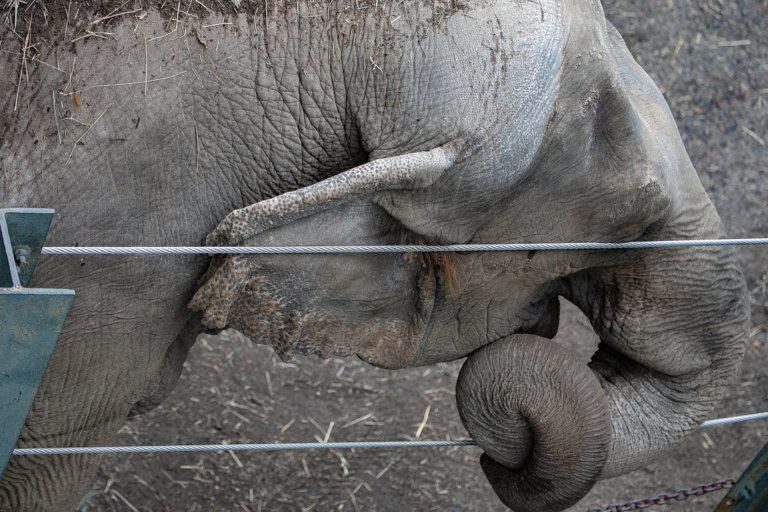
Relevant legislation about Happy
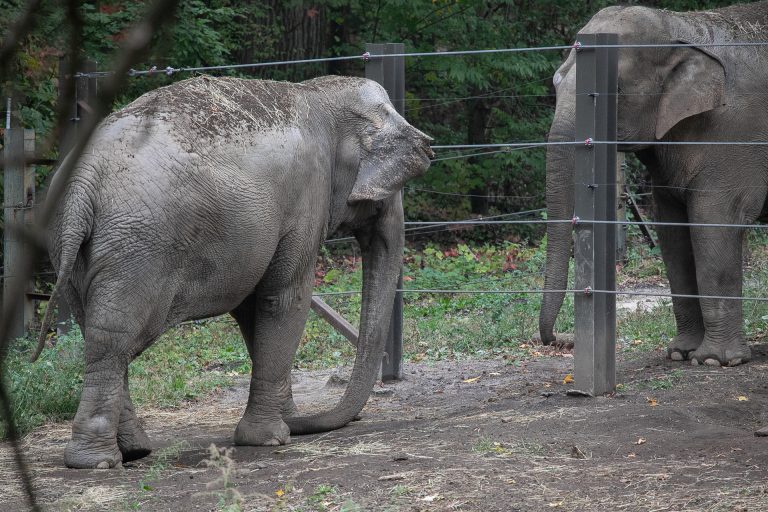
A ban on the keeping, restraint, or possession of elephants
New York
